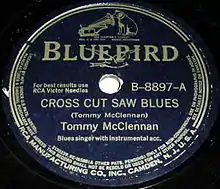Crosscut Saw (song)
"Crosscut Saw", or "Cross Cut Saw Blues" as it was first called, is a dirty blues song "that must have belonged to the general repertoire of the Delta blues".[1] The song was first released in 1941 by Mississippi bluesman Tommy McClennan and has since been interpreted by many blues artists. "Crosscut Saw" became an early R&B chart hit for Albert King,[2] "who made it one of the necessary pieces of modern blues".[1]
| "Cross Cut Saw Blues" | |
|---|---|
 | |
| Single by Tommy McClennan | |
| B-side | "You Can't Read My Mind" |
| Released | 1941 |
| Recorded | September 15, 1941 |
| Studio | RCA Studio A, Chicago |
| Genre | Blues |
| Length | 2:44 |
| Label | Bluebird |
| Songwriter(s) | Unknown |
Original song
Tommy McClennan's "Cross Cut Saw Blues" is a Delta-style blues, which McClennan sings and plays acoustic guitar with an unknown player providing imitation bass[3] accompaniment. The lyrics are rife with double-entendre:
Now I'm a cross cut saw, drag me 'cross yo' log
I'm a cross cut saw, and drag me across yo' log
Babe, I'll cut yo' wood so easy, you can't help say "hot dog"
The song follows the classic twelve-bar blues progression, contrary to Big Bill Broonzy's characterization of McClennan's timing as "change from E to A to B when you feel like changing. Any time will do. Just close your eyes."[4]
Tony Hollins version
Tony Hollins, a Mississippi bluesman and contemporary of Tommy McClennan, recorded a version of "Cross Cut Saw Blues" with similar lyrics on June 3, 1941, three months before McClennan. The song was not released at the time, but eventually appeared in 1992. In an interview, John Lee Hooker, who knew Tony Hollins, was asked "Well, did Tony Hollins or Tommy McClennan do it first? They both recorded it around the same time".[5] Hooker responded "I think Tommy McClennan did it first".[5] In the earlier days of the blues, it was not unusual for an unrecorded or unpublished song to be in the repertoire of several blues singers. In the folk music tradition, such songs were passed around and developed over an extended period of time without regards to ownership. In David "Honeyboy" Edwards' autobiography, The World Don't Owe Me Nothing, Edwards mentioned that he played with both Richard "Hacksaw" Harney and McClennan, and that McClennan got the song "Crosscut Saw" from Harney.[6]
Albert King version
In 1966, Albert King recorded his version calling it "Crosscut Saw". The same lyrics as McClennan's "Cross Cut Saw Blues" were used, except for two verses which were replaced by guitar solos. However, King uses a different arrangement based on an Afro-Cuban rhythm pattern,[7] similar to that of his 1962 song "I Get Evil". Backing King is the Stax Records' house band, Booker T. & the MG's. The song was a success, reaching number 34 in the Billboard R&B chart.[2] It was included on King's Born Under a Bad Sign album, which "became one of the most popular and influential blues albums of the late '60s".[8] The song remained in his repertoire throughout his career and several live versions were issued.
King recorded another studio version of the song for his 1974 album I Wanna Get Funky with many of the same Stax personnel, but a fuller, "funkier" arrangement and beat. Towards the song's middle, he asks drummer Al Jackson, Jr. to help him break down the song to its original rhythm: "Hey Al! Let's do it like we used to do it! Can you remember 1965, when we was gettin' down in that one little room on the other side of the building? We did 'Crosscut Saw' and it went something like this ... You know, I thought you had forgotten that!"
In 1964, R. G. Ford, a Memphis attorney, produced a single of "Cross Cut Saw" by a local group, the Binghamton Blues Boys, on his own East Side Records.[9] The single was only distributed in Memphis. Although the single credits the song to "Group", it is Ford's (who died in the late '60s) name (and sometimes the group members' names) that appear on Albert King's (and some other) releases,[10] for example on Gary B.B. Coleman's 1992 studio album Too Much Weekend.
Recognition
In 2018, "Cross Cut Saw" was inducted into the Blues Foundation Blues Hall of Fame as a "classic of blues recording".[9] In its announcement, the Foundation notes the song's "complicated evolution", but adds that King's version made it a popular blues standard with blues musicians.[9] It also identifies Al Jackson as the one primarily responsible for bringing the song to Stax and King as well as giving it a Latin (Afro-Cuban) beat.[9]
References
- Herzhaft, Gerard (1992). "Crosscut Saw". Encyclopedia of the Blues. Fayetteville, Arkansas: University of Arkansas Press. p. 443. ISBN 1-55728-252-8.
- Whitburn, Joel (1988). Top R&B Singles 1942–1988. Menomonee Falls, Wisconsin: Record Research. p. 238. ISBN 0-89820-068-7.
- Most likely a washtub bass.
- Templeton, Ray (1990). Travelin' Highway Man (Album notes). Tommy McClennan. Travelin' Man. p. 1. TM CD 06.
- O'Neal, Jim; van Singel, Amy (2002). The Voice of the Blues: Classic Interviews from Living Blues Magazine. Routledge. p. 208. ISBN 978-0-415-93654-5.
- David "Honeyboy" Edwards (1 November 1997). The World Don't Owe Me Nothing (First ed.). Chicago Review Press. ISBN 978-1556522758.
- Robert Palmer (1981). Deep Blues. Penguin Books. p. 246. ISBN 978-0-14-006223-6.
- Erlewine, Stephen Thomas. "Albert King – Biography". AllMusic. Retrieved August 13, 2010.
- Blues Foundation (March 6, 2018). "2018 Hall of Fame Inductees: "Cross Cut Saw" – Albert King (Stax, 1966)". The Blues Foundation. Retrieved March 7, 2018.
- Olsson, Bengt (1970). Memphis Blues. Studio Vista. p. 112. ISBN 978-0-289-70033-4.